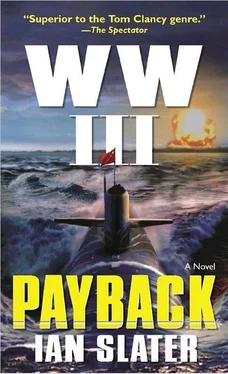“I’m fine,” came an unconvincing Welsh accent. “I’ve taken a Gravol.”
“Yeah,” cut in Aussie as they began the “close hatch and secure” drill. “But don’t nod off on us on the beach.”
“It’ll have worn off by then,” Choir tried to assure him.
The general said nothing, which surprised John Cuso, who would have pigeonholed the legendary commander as a strict, no-drugs commander. And he was right, but Freeman trusted his men and knew none of them would take anything that would endanger the others or undercut their chance of success. He trusted himself to do the same. He asked John Cuso to look in on Tavos. “Wish him well.”
“I’ll do that, General. Good luck.”
As the twin exhaust pulse-jet-thrust engine surged to life, the RS’s wake footpath-thin, unlike the usual road-width wakes left by most craft of its size, Cuso was struck by how quiet it was, no doubt the composite construction of its cigar-tube-shaped superstructure baffling and containing the sound as it rose on an incoming swell under its own soft-throated power, then disappeared into the dark valley of the next trough.
Rhee should have been much calmer than he was at this moment above Kosong’s Beach 5. He had done a six-month high-stress stint on guard duty at Panmunjom, face-to-face with the American and South Korean sentries, where the air fairly crackled with the tension between the two armed camps, the so-called armistice since the uneasy truce of over fifty years ago having done nothing to reduce the mutual hatred.
It was on the DMZ that Rhee had learned how to stare unblinkingly, as did the Americans and South Koreans, for abnormally long periods, like schoolyard foes standing toe to toe, never losing their Gun nae ju ne , what the Americans called “cool.” Rhee thought of his time on the DMZ now because he could feel his chest muscles tightening in anger, lips firmly closed, the torque exerted by his temporal mandibular joint sending a bone ache through his sinuses and around to the back of his head, in what would soon be a full-blown tension headache. Pyongyang’s rudeness in not even responding to his request for Red Dragon all-terrain vehicles for his twenty-five-man rush platoon didn’t help, angering him so much that he could feel his temples starting to throb. He spotted one of his Unit 5 five-man patrols fifty yards away from the beach that lay directly below Kosong’s MANPAD warehouse.
She bal! — Shit! He should not have been able to see anyone in the patrol, but he’d spotted a clump of grass that seemed to be levitating.
“ Megook-saram imnida! I am an American!” he shouted into his throat mike. “I can see you a hundred yards off. Report to me immediately!” With that, Rhee began walking through the damp-smelling coastal brush toward the offending soldier, a short, slim man. He was so thin that his vest load of grenades, flares, and ammunition created the impression of a stick insect afflicted with protruding goiters, the camouflage net on his helmet festooned with dead grass on a background of green coastal vegetation. Rhee’s anger increased as he realized it was Sergeant Moon, one of the veterans who, as a very young man, had volunteered as one of the secret North Vietnamese’s foreigners’ brigade formed by Pyongyang to gain vital field experience in fighting the Americans.
“You should know better!” Rhee snapped at Moon. “Since when does paspalum grass grow at right angles?”
“Sorry, Comrade Lieutenant.”
Rhee nodded, immediately accepting Moon’s apology, and Moon knew the lieutenant was motivated by his annoyance with Pyongyang over HQ’s failure to provide the all-terrain vehicles, preventing him from training a rush platoon to the level of proficiency Rhee wanted in preparation for any American or South Korean infiltration. Moon, who, as Rhee’s most experienced noncommissioned officer in Unit 5, did most of the paperwork when not on patrol, reassured Rhee that he had personally forwarded the requisition for the vehicles. “Perhaps, sir,” Moon said encouragingly, “headquarters have already dispatched them.”
“Hmm—,” began Rhee, pleased that at least he had someone in whom he could confide his frustration with HQ, a frustration that was very dangerous to share, Pyongyang’s political commissars swooping down on the slightest sign of complaint or discontent. “—maybe. But we have heard nothing yet. Not even a radio acknowledgment.”
Moon nodded his agreement, the paspalum grass falling from his helmet’s camouflage net as he did so. “No, sir, but atmospherics have been sabotaging our communications. Solar flare activity’s almost as bad as it was in 2003. The signals officer in Wonsan told me the surges of ions from the sun have even been knocking out American satellite signals and radio traffic.”
Rhee appreciated his sergeant’s efforts to reassure him, but there’d been no interference whatsoever with the radio signals from their allies, the Chinese, who were a lot farther north of Kosong than was Pyongyang. And Rhee pointed out that the traffic from the boot had been as clear as a Korean temple bell. Sergeant Moon was struck by the fact that the lieutenant had used the word “temple.” In the rigidly enforced atheistic state, it was a measure to Moon of just how much the lieutenant trusted him.
“Yes,” agreed Moon thoughtfully, “the traffic from the boot is clear, despite the mountains between us and the flat land along the boot’s toe. Perhaps,” he suggested, “it is an especially powerful station up there, like some of the Japanese-American stations on the west coast of Hokkaido. I have heard a lot of traffic between Pyongyang and the boot. Maybe the solar flaring will die down soon and we’ll get a radio message that the Red Dragons are already on their way.”
“Maybe,” said Rhee, realizing that while Moon was merely trying to placate him, there was a chance, given the hodgepodge that the ionosphere had made of radio communication, that his requisition had been received and acceded to, that a message had been sent to Kosong, with Pyongyang annoyed that it had received no confirmation from Rhee’s Unit 5.
“I’ll call them again,” said Rhee, but there was hesitation in his tone, and Moon knew it was well advised, junior officers in any army knowing that they do well not to become a pain in the neck to their superiors. Nevertheless, Sergeant Moon encouraged the lieutenant to call, suggesting, “Perhaps our requisition got lost?” Anything was possible. The sergeant had heard that even in the so-called highly efficient capitalist societies, important messages were sometimes inexplicably delayed and went astray. An old NKA major had once told him that when the arch enemies of Korea, the Japanese, had attacked America on December 8, 1941, December 7 in the United States, at the beginning of the great imperialist war in the Pacific, the vital message warning the American admiral Kimmel, commanding Pearl Harbor, of the impending Japanese onslaught had been sent from Washington, D.C., by regular telegram.
“Yes,” said Rhee. “I’ll call Colonel Kim on the Trace.” The latter was an American word for the DMZ.
Moon nodded his assent but said nothing. This way if there was a sharp retort from Colonel Kim, the sergeant could say that he hadn’t verbally agreed to press the colonel on the matter.
Rhee took out his cell phone. The static was worse than the previous day. He would have to go into Kosong and use a landline. At least there was no need to use code; a request for twenty all-terrain vehicles was hardly a national secret. Besides, even if the Americans intercepted the message it would simply be another in the flood of millions of signals that were scanned by American fleets and other listening posts that America’s National Security Agency in Maryland assiduously monitored every second of every day.
Читать дальше












